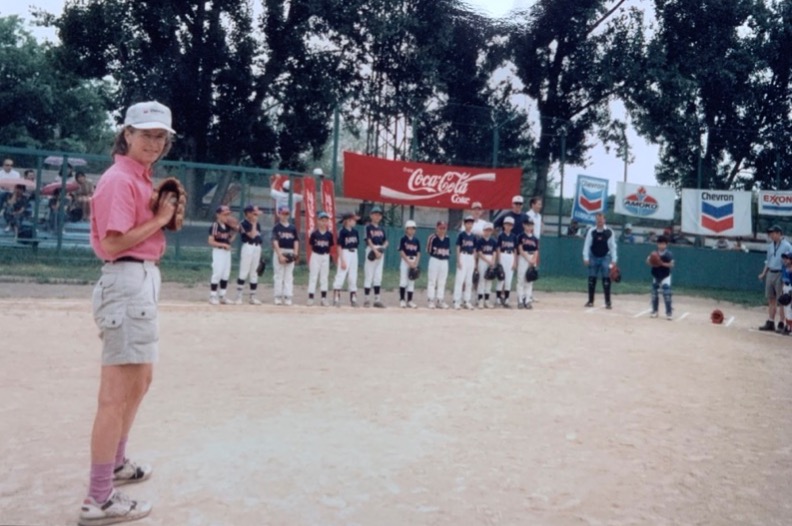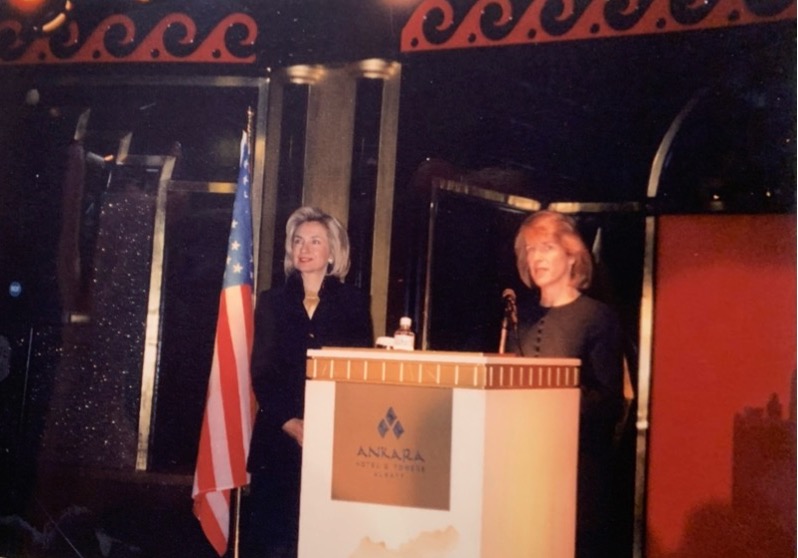Kazakhstan Plays the U.S. Card to Reinforce its Independence (1995-1998)
Recent Articles
Author: Ambassador (ret.) Elizabeth Jones
05/10/2021

Kazakhstan, the last of the Central Asia/Caucasus republics to declare independence, tried out ways to shore up its new status. As President Nazarbayev developed his multi-vector diplomacy, he and his Cabinet sought U.S. support when they believed our interests coincided. They deployed that strategy in interesting ways during the 1995 to 1998 period of my ambassadorship in Kazakhstan when they judged they needed to show Moscow that they had other friends.

Snowboarding at Shymbulak in the Tien Shen outside Almaty, 1997
As the Taliban was gaining strength and moving north in Afghanistan, the Russians began hinting that the Central Asia states were in danger of an incursion by the Taliban. Although the focus was on Tajikistan and Uzbekistan as the countries closest to Mazar-i-Sharif, there was loose talk that the Taliban could get as far as Kazakhstan and Kyrgyzstan. And the Russians, as “good neighbors,” suggested deploying Russian troops on the southern borders of each of the Central Asian countries “to help them” against the Taliban. The Uzbeks said “no.” The Tajiks already had Russian troops on their borders, as did the Kyrgyz. Moscow, without much notice, announced that President Boris Yeltsin would visit Almaty. The pressure from Moscow was on.
I was summoned to meet with President Nazarbayev. No agenda was specified. Sitting alone in his office, President Nazarbayev pulled out a map of Afghanistan and began to ask details of where the Taliban were and about the topography between Mazar-i-Sharif and the Uzbek border. Finally my tour in Afghanistan could be put to use! I had travelled all over Afghanistan in the safe days of the early ‘70’s, so could explain quite a bit to the President. He said nothing about the Russians.

Ambassador Jones Coaching Little League in Almaty. At the time, the embassy taught young Kazakhstani children how to play baseball
As the meeting ended, I outlined what I would say to the waiting press. He never joined me for the press read-out, so this pre-brief was my habit. Instead, President Nazarbayev walked out to the press corps with me. He explained to the journalists that he had had a good conversation with the American Ambassador on the mutual strategic interests of our two countries. Picking up on his tactic, I reported for the media the importance to the United States of the independence, sovereignty, and territorial integrity of Kazakhstan. Then President Nazarbayev excused himself, saying he was due at the airport to greet his Russian guest. Kazakhstani TV broadcast the comments in full. President Nazarbayev had played his American card just as the Russian leader was landing in Kazakhstan. There was no further mention of Russian troop deployment to Kazakhstan.
It was not only President Nazarbayev who played the U.S. card. The Prime Minister told me he wanted a U.S. oil company to operate an oil field along Kazakhstan’s northern border to serve as a tripwire should the Russians try to take that part of Kazakhstan. While grateful that a U.S. firm could win a lucrative deal, I had to explain that U.S. troops were unlikely to be deployed to Kazakhstan against Russia.

Ambassador Jones Introducing then First Lady Hillary Clinton at Embassy Almaty Town Hall, November 1997
Russia and Kazakhstan were negotiating an agreement on expanded use of the Caspian pipeline (CPC) that carried Kazakhstani oil through Russia to the Black Sea and international markets. As the Energy Minister was preparing to leave for the final round of CPC negotiations in Moscow, his staff called and asked that I make the trip as well. I asked why. “The Minister wants you there to show the Russians that he has U.S. support.” As Kazakhstani access to CPC – and working against Russia having sole control of the pipelines -- were U.S. policy priorities, I went. Kazakhstan got the deal it wanted – and U.S. policy chalked up an important win for Kazakhstan’s ability to ship its oil to markets and to assure its economic viability.
###
On May 14, join four former United States Ambassadors to Kazakhstan to discuss the key developments in the U.S.-Kazakhstan relationship over the last three decades. Register here to receive a livestream link prior to the event.